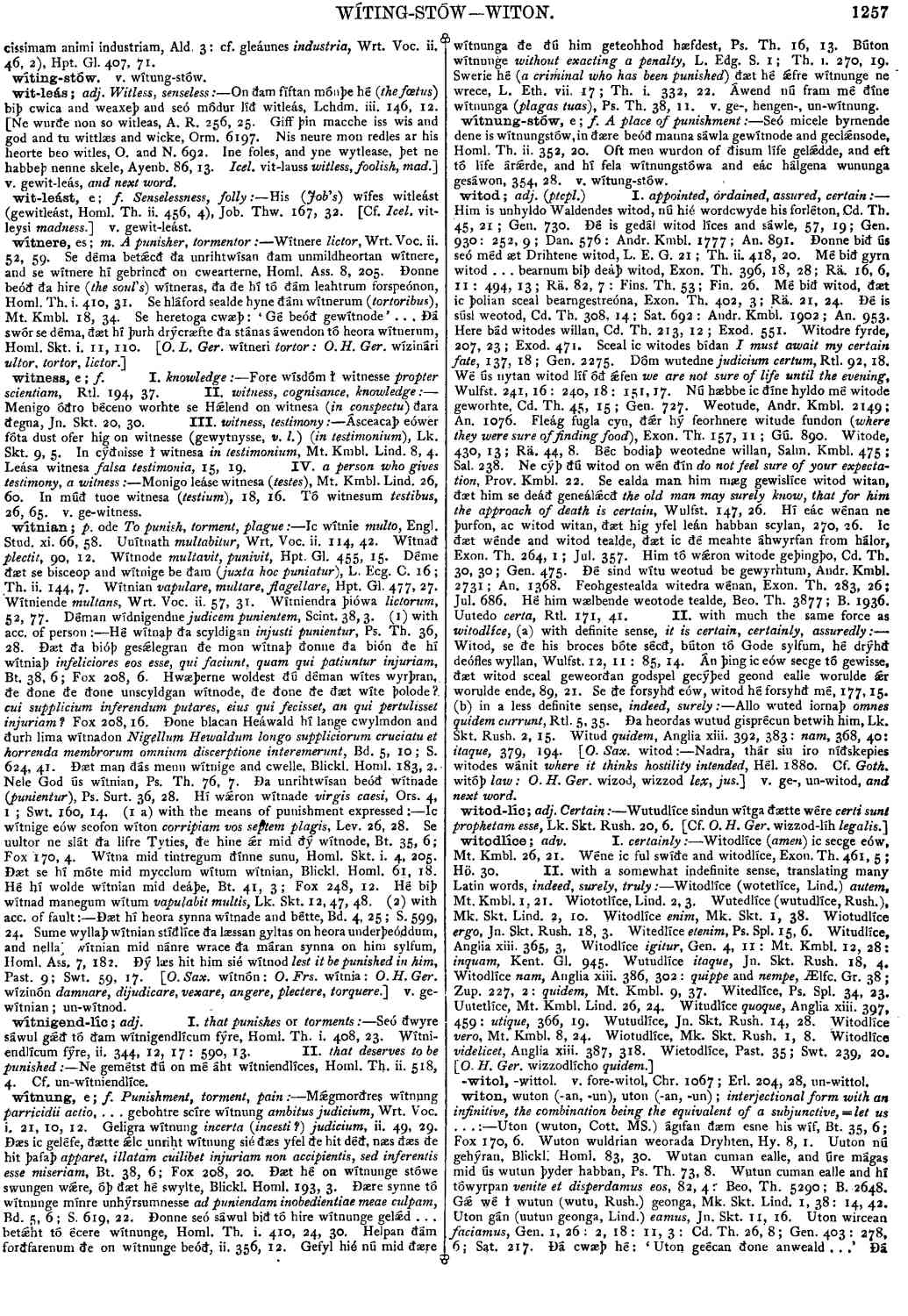witod
- adjective
-
Him is unhyldo Waldendes witod, nú hié wordcwyde his forléton,
- Cd. Th. 45, 21 ;
- Gen. 730.
-
Ðé is gedál witod líces and sáwle,
- 57, 19 ;
- Gen. 930: 252, 9 ;
- Dan. 576 :
- Andr. Kmbl. 1777 ;
- An. 891.
-
Ðonne bið ús seó méd æt Drihtene witod,
- L. E. G. 21 ;
- Th. ii. 418, 20.
-
Mé bið gyrn witod . . . bearnum biþ deáþ witod,
- Exon. Th. 396, 18, 28 ;
- Rä. 16, 6, 11 :
- 494, 13 ;
- Rä. 82, 7 :
- Fins. Th. 53 ;
- Fin. 26.
-
Mé bið witod, ðæt ic þolian sceal bearngestreóna,
- Exon. Th. 402, 3 ;
- Rä. 21, 24.
-
Ðé is súsl weotod,
- Cd. Th. 308, 14 ;
- Sat. 692 :
- Andr. Kmbl. 1902 ;
- An. 953.
-
Here bád witodes willan,
- Cd. Th. 213, 12 ;
- Exod. 551.
-
Witodre fyrde,
- 207, 23 ;
- Exod. 471.
-
Sceal ic witodes bídan
I must await my certain fate,
- 137, 18 ;
- Gen. 2275.
-
Dóm wutedne
judicium certum,
- Rtl. 92, 18.
-
Wé ús nytan witod líf óð ǽfen
we are not sure of life until the evening,
- Wulfst. 241, 16 :
- 240, 18: 151, 17.
-
Nú hæbbe ic ðíne hyldo mé witode geworhte,
- Cd. Th. 45, 15 ;
- Gen. 727.
-
Weotude,
- Andr. Kmbl. 2149 ;
- An. 1076.
-
Fleág fugla cyn, ðǽr hý feorhnere witude fundon
(where they were sure of finding food),
- Exon. Th. 157, 11 ;
- Gú. 890.
-
Witode,
- 430, 13 ;
- Rä. 44, 8.
-
Béc bodiaþ weotedne willan,
- Salm. Kmbl. 475 ;
- Sal. 238.
-
Ne cýþ ðú witod on wén ðín
do not feel sure of your expectation,
- Prov. Kmbl. 22.
-
Se ealda man him mæg gewislíce witod witan, ðæt him se deáð geneálǽcð
the old man may surely know, that for him the approach of death is certain,
- Wulfst. 147, 26.
-
Hí eác wénan ne þurfon, ac witod witan, ðæt hig yfel leán habban scylan,
- 270, 26.
-
Ic ðæt wénde and witod tealde, ðæt ic ðé meahte áhwyrfan from hálor,
- Exon. Th. 264, 1 ;
- Jul. 357.
-
Him tó wǽron witode geþingþo,
- Cd. Th. 30, 30 ;
- Gen. 475.
-
Ðé sind wítu weotud be gewyrhtum,
- Andr. Kmbl. 2731 ;
- An. 1368.
-
Feohgestealda witedra wénan,
- Exon. Th. 283, 26 ;
- Jul. 686.
-
Hé him wælbende weotode tealde,
- Beo. Th. 3877 ;
- B. 1936.
-
Uutedo
certa,
- Rtl. 171, 41.
-
Witod, se ðe his broces bóte sécð, búton tó Gode sylfum, hé drýhð deófles wyllan,
- Wulfst. 12, 11 :
- 85, 14.
-
Án þing ic eów secge tó gewisse, ðæt witod sceal geweorðan godspel gecýþed geond ealle worulde ǽr worulde ende,
- 89, 21.
-
Se ðe forsyhð eów, witod hé forsyhð mé,
- 177, 15.
-
Allo wuted iornaþ
omnes quidem currunt,
- Rtl. 5, 35.
-
Ða heordas wutud gisprécun betwih him,
- Lk. Skt. Rush. 2, 15.
-
Witud
quidem,
- Anglia xiii. 392, 383:
nam,
- 368, 40:
itaque,
- 379, 194.
- Hél. 1880.
Bosworth, Joseph. “witod.” In An Anglo-Saxon Dictionary Online, edited by Thomas Northcote Toller, Christ Sean, and Ondřej Tichy. Prague: Faculty of Arts, Charles University, 2014. https://bosworthtoller.com/36304.
Checked: 1